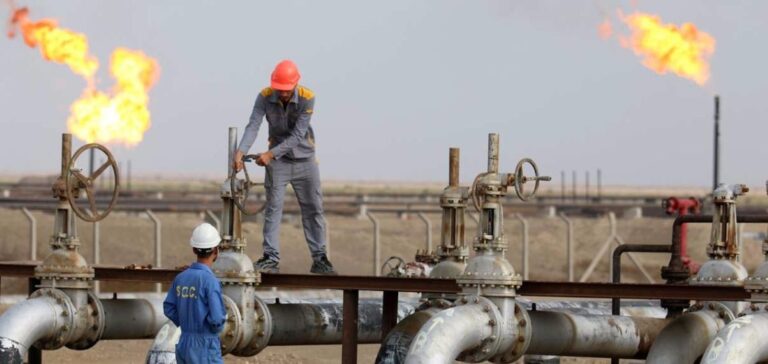Iraq will pay for its Iranian gas imports by supplying oil to Tehran, a way of circumventing the laborious mechanism currently being followed and initially negotiated with Washington to avoid contravening US sanctions, the Prime Minister announced on Tuesday.
Iranian gas unpaid in Iraq: Tensions rise due to US sanctions
Because of US sanctions against Iran, Baghdad cannot pay Tehran directly for its gas. The money is then deposited in an Iraqi bank account, which only allows Iran to purchase specific products in the agri-food and pharmaceutical sectors. The process is always very arduous, and one delay follows another.
To force Baghdad to pay its unpaid bills, Tehran regularly suspends its gas supplies, which are essential for Iraq’s power plants since they cover a third of the country’s needs. For the past ten days, Iran has halved its gas supplies to Iraq, due to over eleven billion euros in unpaid bills, deposited in this bank account but which Tehran cannot use, Iraqi Prime Minister Mohamed Chia al-Soudani acknowledged in a televised address on Tuesday evening.
Iranian gas unpaid in Iraq: Geopolitical tensions and supply solutions
“As the American side has not given the required authorizations for the transfer of funds (…), the supply of Iranian gas has been halted”, Mr. Soudani lamented. “We have not been able to obtain authorization to transfer all these outstanding payments so that our Iranian neighbor can continue to supply us” with gas, he added, citing the “complexity” of the “transfer mechanism”, the “severity of the sanctions” and the “complicated procedures of the US Treasury”, but acknowledging a recent payment of 1.8 billion euros.
There was no immediate reaction from Washington to the Iraqi statement. However, an “agreement” was negotiated with an Iranian delegation in Baghdad.
“exchange in kind, i.e. we will give crude oil or heavy fuel oil in exchange for Iranian gas”, announced the Prime Minister. “In this way, we can guarantee continuity of gas supply,” he summarized.
In recent days, cuts in Iranian gas supplies have worsened the daily electricity shortages, while temperatures in Baghdad and the south of the country are approaching 50 degrees, provoking strong public discontent in a country with crumbling infrastructure and undermined by corruption.






















